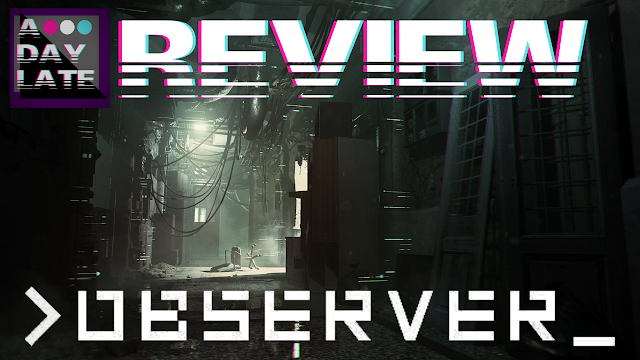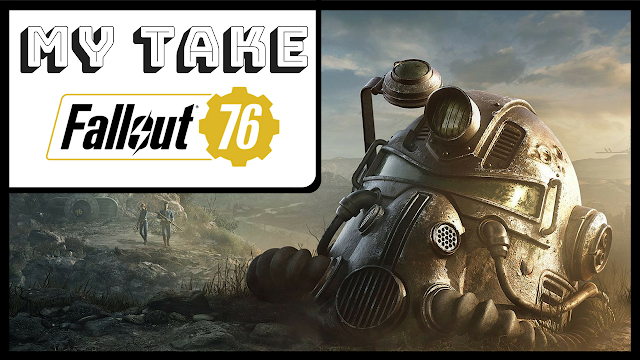A Day Late:
Observer Review
There’s nothing quite like finishing a game and being left in a state of reflection of what you’ve just accomplished. It can be bittersweet, but on the best of occasions it can have a lasting impact on those lucky enough to experience it. Observer is an experience that fits this mold perfectly. With its blend of brain-invading psychological horror, vibrant and diverse visuals as well as a narrative that is as gripping as ever, it’s a thrill ride worth the price of admission.
Story/Concepts: 9
Observer puts you in the cybernetic shoes of Detective Daniel Lazarski, a Krakowian cyborg Observer unit for the local police force. After receiving a call from your estranged son, you head to the source of the communication to investigate what exactly happened. Upon doing so, you’re given a deep look into the dystopian Polish ecosystem that has been ravaged by war, drugs and crime to the point where those deemed unfit for the corporate elite are relegated to low end living solutions. Along with these societal ailments comes the addiction to “modifications”, which are cybernetic upgrades that citizens seek to enhance their bodies. With this addiction came the mysterious Nanophage, a “digital plague” that has run rampant among those who have opted for these enhancements to their ill-equipped bodies.
Within this world is a deeply rooted and gripping narrative that digs beyond the surface of your duties as a detective. It’s an experience in which the more you uncover, the more you feel your grasp on reality slipping away. It’s safe to say that your goal extends far beyond saving your son and, without getting into spoiler territory, holds a greater weight to it than meets the eye. You’ll find yourself wondering where exactly you’re going to end up when it’s all said and done, and that mystery is what keeps you around to see the weighty ending that Observer drops on you.
Gameplay/Controls: 8
As with many detective experiences within games such as LA Noire, you’ll happen upon a crime scene that requires investigation. The tools at your disposal are unique and clever in their execution. Detective Lazarski has three main tools of examination: Biological, Technological and The Dream Eater. Your biological and Technological scans work similarly, as they bring up a specific lens that allows you to pick out specific pieces of biological matter or technological equipment to further examine. It can get tedious at times, but it’s to be expected when you’re picking a crime scene clean to ensure you have all the pieces to the puzzle. The Dream Eater tool, however, is an entirely unique and clever strategy to obtain evidence. Observer Detectives have the ability to “plug in” to a suspect’s brain and access prior memories to uncover evidence. These sequences are easily the most fascinating gameplay aspect to Observer’s palette. These memory examinations play as a jumbled mess you’re tasked with piecing together to recreate past events in a logical way. In a gameplay sense, they provide jump-scares that feel earned, beautifully creepy imagery and sound design unlike I’ve ever experienced. All of these factors create an experience that is one of a kind.
Although these sections are incredible, there are other aspects to Observer’s offerings that feel less spectacular. During some of the Dream Eater sequences, you’re forced to endure a few stealth evasion puzzles that feel more intrusive than conducive. They nearly rip you out of the atmospheric vibe and force you to perform “video-gamey” tasks that feel out of place when taken as a whole. Outside of the stealth shortcomings, the dialogue system presents a sense of choice, but those choices hold little to no weight when progressing through the narrative. This is coupled with a few objectives that are rather difficult to interpret that will have you searching a room or lost in a series of corridors trying to find out exactly what you’re supposed to be doing.
It’s worth noting that the game controls just fine. I didn’t encounter any instances where I felt that I was being hampered by unintuitive control-schemes or stiffness within the operations. Menus and interfaces are basic, but serviceable, and interacting with objects is smooth and predictable. I would however, recommend playing on PC versus console, as it is much easier to control objects, drawers and doors with a mouse rather than an analog stick.
Graphics/Performance: 9.5
If there’s one area where Observer stands out among its other strong qualities it’s almost certainly the visual presentation. It doesn’t feel like a flashy, pristine representation of Cyberpunk, rather a lived-in slum where technology has run its course. The apartment complex you spend most of your time in looks and feels like a part of the world society has forgotten. Conversely, the Dream Eater sequences feel like a tour through a twisted art book full of vibrant colors, jagged concoctions and symbolistic set pieces that comprise what it’s like to be in the head of a criminal. These segments are truly haunting due to their visual flair and attention to detail. If you are wanting to give this title a try but are on the fence, these segments alone are worth the price of admission. Along the way of looks, character models look well enough but aren’t anything to rival the motion capture elites of the current slate of games.
One drawback to having such a vibrant art style is that there are a few performance conundrums that come along with the intended look of corrupted technology. The game’s “glitchy” nature can provide some distracting visuals that can both get in the way and make you think you’re experiencing an actual hitch with your hardware. It’s not overly troublesome, but does provide some unpleasant side effects. Keeping on the subject of performance, there were a few places that took extra time to load within the game, but I didn’t experience any major technical issues. The problems mostly took place when entering a room that had a whole other world locked behind it. Although it happened less often than you might expect, it was still jarring nonetheless.
Sound/Voice/Score: 8.5
Where Observer once again tickles your senses is in the sound department. Overall, the game’s soundtrack and score consist of haunting horror tracks that keep the mood anything but relaxed, and cyberpunk glitch tunes that feed into the overall feel that you’re slowly being corrupted by the events of the game.
When the music stops, you’re left with sound design that leans fully into the source material. From echo-filled corridors to eerily quiet murder scenes, the game never lets you feel like you can take a moment to breath. You’ll always walk the environments with a sense that you’re not only being watched, but followed by an entity you have yet to uncover.
When examining the other aspects of Observer’s audio characteristics, it cannot be ignored just how well Rutger Hauer, who voices Daniel, fills the role he’s been given. The Blade Runner star plays a role in a similar tone to the one that made him famous within the sci-fi community. Although some may feel his line delivery is unenthusiastic, I felt his performance perfectly encapsulated what Detective Lazarski is from every aspect. From his no-nonsense interrogation scenes to his sentimental search to figure out the mystery surrounding his son, the Detective always feels as if he has motive for his actions. Other than Hauer, the rest of the voice cast does an admirable, if unimpressive, job of fulfilling their given characters. None of the actors sound bad, necessarily, but none of them provide any characteristics that put them on the same plane as Hauer.
Length/Replay Value: 8.5
With a gaming landscape filled with RPGs lasting well into the 100+ hour spectrum and multiplayer games with seemingly endless content to sift through, it can be hard to make the case that single player games have a place in today’s world of interactive content. Observer makes a bold case that length is not necessarily best. Coming in at just under seven hours, the campaign’s pace is brilliantly brisk and never feels like a slog. If the game were any longer, it would have been bloated by unnecessary content that felt tacked on to create artificial length. Conversely, if the game was shorter, it would have left you no time to stop and take in the beautiful sights, creative sounds and wonderful atmosphere the game has to offer. This all works in the favor of its $29.99 price-point that puts it well within reach for those seeking to experience what it has to offer. You’re not going to be scratching your head at a full retail price for a game that lasts about as long as your average work day.
In a full examination of the value presented, it’s worth mentioning that this game does have a relatively low replay value, as expected with most single player narrative games. If you are hoping to come back for a second or third playthrough, however, there are several secret areas and hidden collectibles to be found. Don’t expect to be searching for hundreds of hidden items, but you can be prepared to be moderately challenged tracking down every last Nanophage Card.
Final Word:
Experiences like the one Observer has to offer are becoming increasingly rare in the world of gaming. Its tight narrative, excellent environments and memorable visuals provide a worthy canvas to demonstrate why video games are considered an art form. Although the game does slip a few times along the way, it’s a captivating world that I didn’t want to leave. Observer truly stands tall amongst a world crowded with loot boxes and DLC to remind us that sometimes we just need to sit back and let someone tell us a story.



Comments
Post a Comment